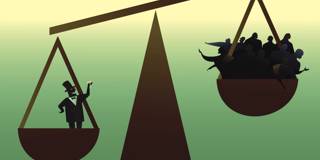Worsening economic inequality in recent years is largely the result of policy choices that reflect the political influence and lobbying power of the rich. There is now a self-reinforcing pattern of high profits, low investment, and rising inequality – posing a threat not only to economic growth, but also to democracy.
NEW DELHI – Since reducing inequality became an official goal of the international community, income disparities have widened. This trend, typically blamed on trade liberalization and technological advances that have weakened the bargaining power of labor vis-à-vis capital, has generated a political backlash in many countries, with voters blaming their economic plight on “others” rather than on national policies. And such sentiments of course merely aggravate social tensions without addressing the root causes of worsening inequality.
But in an important new article, University of Cambridge economist José Gabriel Palma argues that national income distributions are the result not of impersonal global forces, but rather of policy choices that reflect the control and lobbying power of the rich. In particular, Palma describes the significant recent increase in inequality in OECD countries, the former socialist economies of Central and Eastern Europe, and China and India, as a process of “reverse catching-up.” These countries, Palma says, increasingly resemble many unequal Latin American economies, with rent-oriented elites grabbing most of the fruits of growth.
In his earlier work, Palma showed how middle and upper-middle income groups’ share of total income has remained remarkably stable in most countries over time, at about one-half. Changes in aggregate income distribution, therefore, resulted largely from changes in the respective shares of the top 10% and the bottom 40% of the population (the ratio between these shares is now called the “Palma ratio”).

NEW DELHI – Since reducing inequality became an official goal of the international community, income disparities have widened. This trend, typically blamed on trade liberalization and technological advances that have weakened the bargaining power of labor vis-à-vis capital, has generated a political backlash in many countries, with voters blaming their economic plight on “others” rather than on national policies. And such sentiments of course merely aggravate social tensions without addressing the root causes of worsening inequality.
But in an important new article, University of Cambridge economist José Gabriel Palma argues that national income distributions are the result not of impersonal global forces, but rather of policy choices that reflect the control and lobbying power of the rich. In particular, Palma describes the significant recent increase in inequality in OECD countries, the former socialist economies of Central and Eastern Europe, and China and India, as a process of “reverse catching-up.” These countries, Palma says, increasingly resemble many unequal Latin American economies, with rent-oriented elites grabbing most of the fruits of growth.
In his earlier work, Palma showed how middle and upper-middle income groups’ share of total income has remained remarkably stable in most countries over time, at about one-half. Changes in aggregate income distribution, therefore, resulted largely from changes in the respective shares of the top 10% and the bottom 40% of the population (the ratio between these shares is now called the “Palma ratio”).